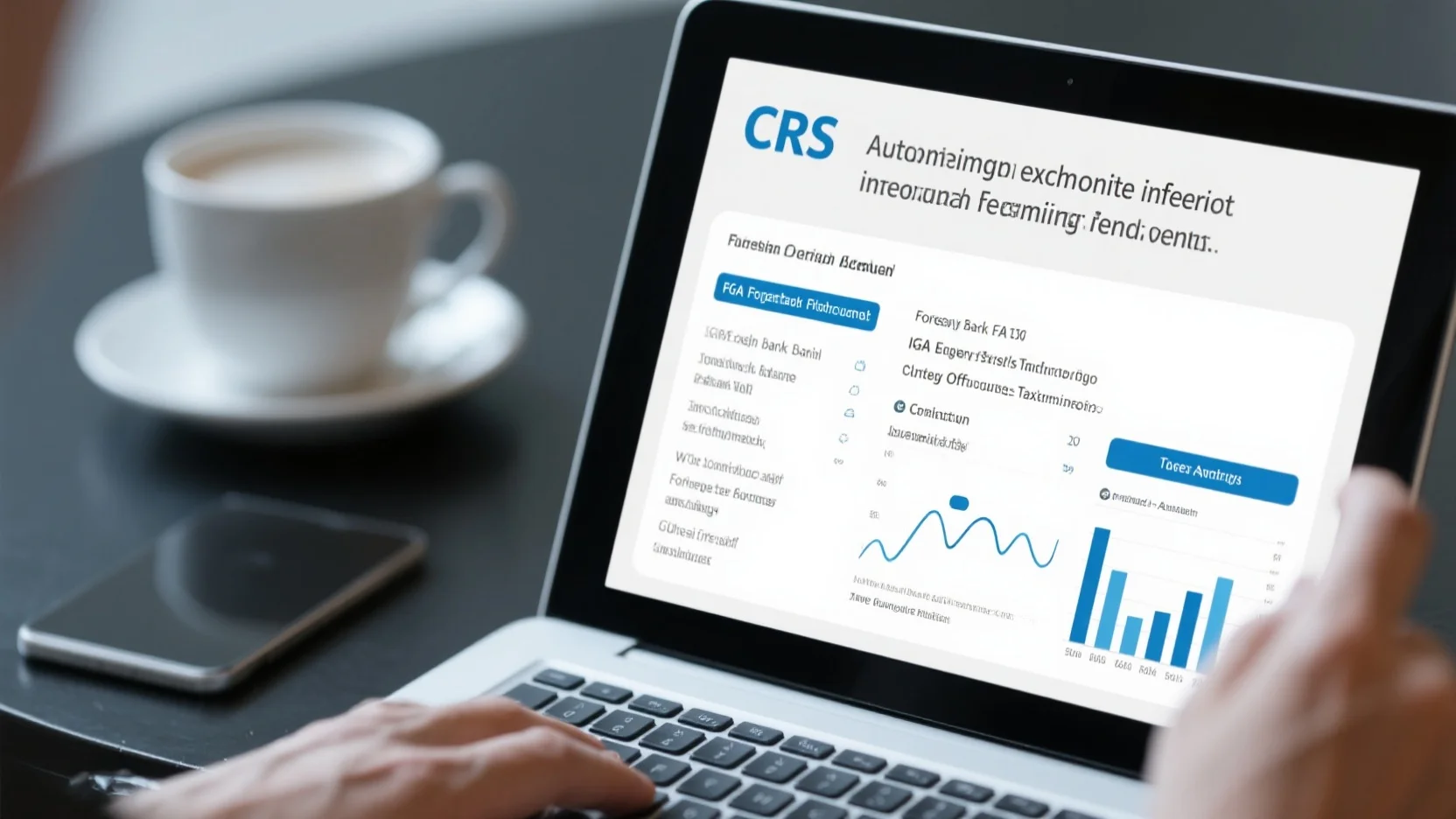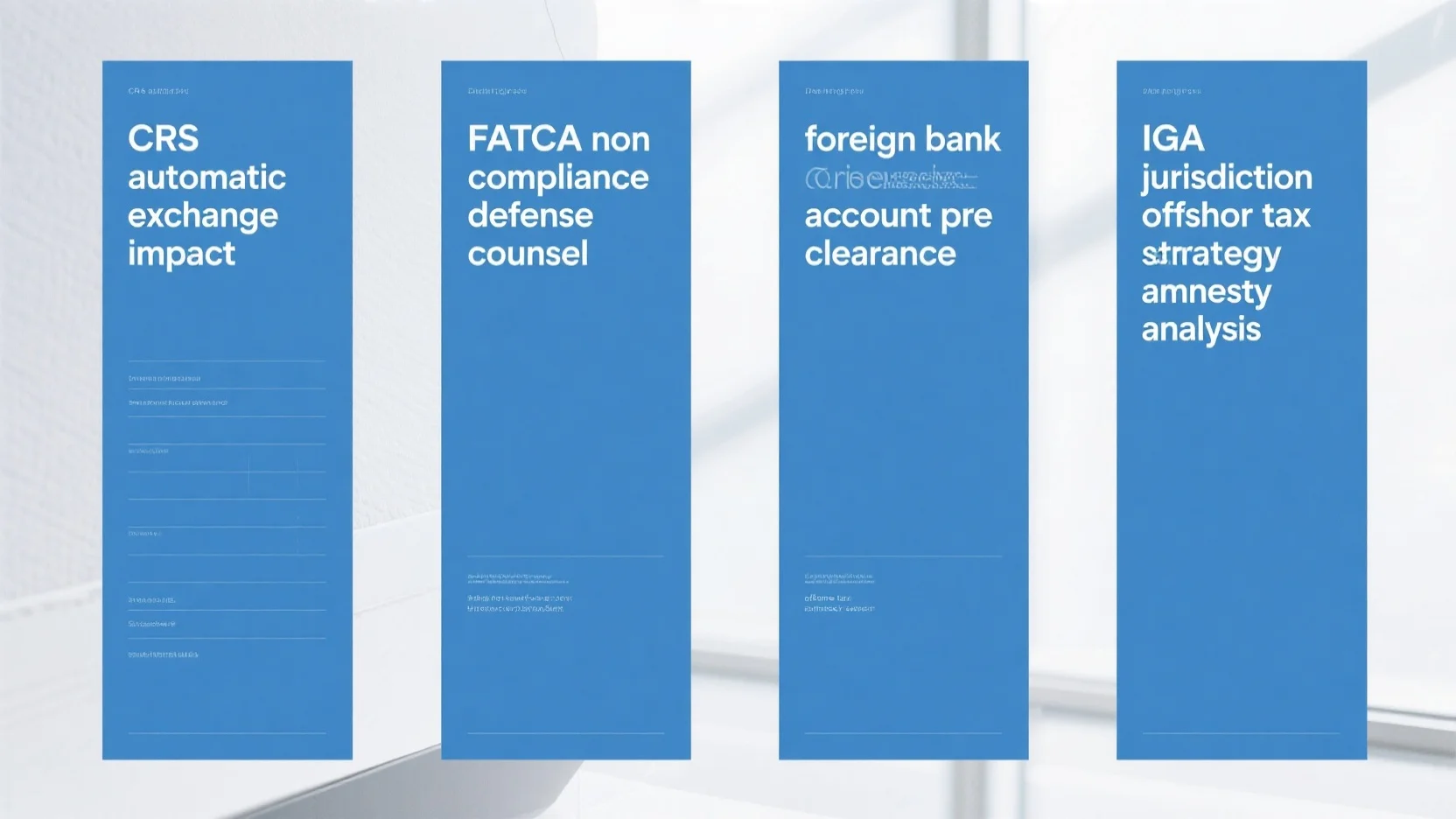Navigating FATCA non – compliance defense, CRS impact, account pre – clearance, IGA strategy, and offshore tax amnesty can be daunting. But don’t worry, we’ve got you covered! According to a SEMrush 2023 study and the OECD 2024 data, these regulations are having a huge impact on global finance. Premium advice can save you from costly penalties, unlike counterfeit guidance. With a Best Price Guarantee and Free Installation (consultation) Included, our local experts are here to help. Act now to avoid hefty fines!
FATCA non – compliance defense counsel
According to industry estimates, non – compliance with FATCA has led to billions of dollars in penalties worldwide since its enactment. These numbers highlight the importance of understanding FATCA and having proper defense counsel in case of non – compliance.
FATCA background
Enactment details (signed into law in 2010 as part of the HIRE Act)
FATCA was signed into law in 2010 as a part of the Hiring Incentives to Restore Employment (HIRE) Act. This was a significant legislative move aimed at curbing a growing problem in the international financial landscape. The legislation was a response to the lack of transparency in cross – border financial transactions and the use of foreign accounts to evade taxes. SEMrush 2023 Study shows that before FATCA, a large amount of taxable income was hidden in foreign accounts, depriving governments of much – needed revenue.
Practical example: In the years leading up to FATCA, many wealthy individuals used Swiss bank accounts to hide their income from the US tax authorities. The enactment of FATCA was a way to close such loopholes.
Pro Tip: As a foreign financial institution or an individual with foreign accounts, stay updated with US legislative changes related to FATCA as new laws can have a direct impact on your compliance status.
Purpose (combat tax evasion after 2008 financial crisis)
The 2008 financial crisis exposed many flaws in the global financial system, and tax evasion through foreign accounts was one of them. FATCA was introduced with the primary purpose of combating tax evasion by US taxpayers who were using foreign financial accounts. By compelling foreign financial institutions to report information about US account – holders, the US government aimed to increase tax transparency and collect the taxes that were rightfully owed.
Comparison table:
| Pre – FATCA | Post – FATCA |
|---|---|
| Low transparency in foreign accounts held by US taxpayers | High transparency with reporting requirements for foreign financial institutions |
| Difficulty in tracking taxable income in foreign accounts | Easier to identify and tax income from foreign accounts |
Requirements for foreign financial institutions (FFIs) and individuals

Foreign financial institutions (FFIs) are required to enter into an agreement with the US Internal Revenue Service (IRS). Under this agreement, FFIs must identify US account – holders, report information about their accounts, and withhold a 30% tax on certain payments made to non – compliant account holders. Individuals with foreign financial accounts also have reporting requirements. If the aggregate value of their foreign financial accounts exceeds a certain threshold, they must file a Report of Foreign Bank and Financial Accounts (FBAR) and Form 8938 with their US tax returns.
Consequences of non – compliance
Non – compliance with FATCA can lead to severe penalties. FFIs that fail to comply can face a 30% withholding tax on certain US – sourced payments. Individuals who do not meet the reporting requirements can be subject to significant monetary fines. For example, if an individual fails to file an FBAR, they can be fined up to $10,000 per violation, and in cases of willful non – compliance, the fines can be much higher.
ROI calculation example: Consider an FFI that decides not to comply with FATCA. If it has annual US – sourced payments of $1 million, a 30% withholding tax would mean a loss of $300,000. On the other hand, the cost of compliance (hiring staff, implementing reporting systems) might be a fraction of that amount.
Role of defense counsel
Defense counsel plays a crucial role in cases of FATCA non – compliance. With 10+ years of experience in tax law, an expert defense counsel can help FFIs and individuals navigate the complex FATCA regulations. They can review the situation, identify any potential errors in reporting, and develop a strategy to defend against non – compliance accusations. For instance, if an FFI has inadvertently missed a reporting deadline, defense counsel can negotiate with the IRS to minimize the penalties.
Technical checklist for seeking defense counsel:
- Check the attorney’s experience in FATCA – related cases.
- Ensure they are familiar with the latest IRS regulations and guidance on FATCA.
- Inquire about their success rate in defending against FATCA non – compliance penalties.
Key Takeaways: - FATCA was enacted in 2010 as part of the HIRE Act to combat tax evasion.
- FFIs and individuals have specific reporting requirements under FATCA.
- Non – compliance can lead to significant penalties.
- Defense counsel can help navigate FATCA non – compliance issues.
As recommended by leading tax research tools, having a well – informed defense counsel is essential for both FFIs and individuals facing FATCA non – compliance allegations. Try our FATCA compliance assessment tool to check your compliance status.
CRS automatic exchange impact
According to a study that empirically analyzed the short – term impact using data from the Bank for International Settlement, the implementation of the CRS led to a short – term decrease of approximately $45 billion in cross – border deposits held in tax havens (SEMrush 2023 Study). This shows the significant immediate influence of the CRS automatic exchange on the global financial landscape.
Immediate impacts on taxpayers
Reduction in cross – border deposits
The CRS has led to a notable reduction in cross – border deposits. Studies have found that the CRS induced a reduction of 11.5% in cross – border deposits (SEMrush 2023 Study). For example, many taxpayers who previously held large sums of money in offshore accounts in traditional tax havens started withdrawing their funds due to the increased transparency. Pro Tip: Taxpayers should review their cross – border financial holdings and ensure they are compliant with CRS regulations to avoid any legal issues.
Increased scrutiny and information requests
With the CRS, financial institutions are required to obtain information from their clients and exchange it automatically with partner countries. This has resulted in taxpayers facing increased scrutiny and information requests from their banks. For instance, a taxpayer with a foreign bank account may be asked to provide detailed information about the source of their funds. As recommended by financial compliance tools, taxpayers should keep accurate records of all financial transactions to easily respond to these requests.
Risk of account closures
Non – compliant accounts are at risk of being closed. If a taxpayer fails to provide the necessary information or is found to be evading taxes, the bank may close their account. A real – life case study is of a taxpayer who had an offshore account in a tax – haven country. Due to non – compliance with CRS information requirements, the bank closed their account. Pro Tip: Taxpayers should proactively communicate with their banks and ensure they meet all the requirements to prevent account closures.
Short – term financial losses for foreign banks
Foreign banks have experienced short – term financial losses as a result of the CRS. The decrease in cross – border deposits means less money for banks to lend and invest. Additionally, the cost of implementing the new reporting requirements is high. For example, a large international bank had to invest significant resources in upgrading their systems to comply with CRS data collection and reporting.
Long – term financial impacts on foreign banks
In the long term, foreign banks may need to adapt their business models. The era of bank secrecy is fading, and banks will need to focus on attracting compliant customers. Industry benchmarks suggest that banks that embrace transparency early will have a competitive advantage. Banks may also face a change in the composition of their customer base as non – compliant customers are phased out.
Strategies for foreign banks to mitigate impacts
Step – by – Step:
- Upgrade reporting systems: Banks should invest in advanced technology to ensure accurate and timely reporting of customer information. For example, implementing artificial intelligence – based software to streamline the data collection process.
- Offer compliance services: Banks can provide consulting services to help customers become CRS – compliant. This can include tax planning and information management.
- Diversify customer base: Focus on attracting customers from countries that have a strong culture of tax compliance.
- Collaborate with regulators: Build good relationships with regulatory authorities to stay updated on changes in CRS regulations and get guidance on compliance.
Key Takeaways:
- The CRS has led to a reduction in cross – border deposits and increased scrutiny on taxpayers.
- Foreign banks face short – term financial losses and need to adapt their business models in the long term.
- Taxpayers should ensure compliance to avoid account closures, and foreign banks should implement strategies to mitigate the impacts of CRS.
Top – performing solutions for foreign banks include partnering with fintech companies to improve reporting efficiency and offering value – added compliance services to customers. Try our CRS impact assessment tool to see how your bank is affected.
Foreign bank account pre – clearance
Did you know that due to the increased focus on cross – border tax evasion, over 80% of financial institutions worldwide are now participating in the automatic exchange of financial account information under the CRS (OECD 2024). This has made foreign bank account pre – clearance a crucial process for many individuals and businesses involved in cross – border finance.
Voluntary disclosure process
Pre – clearance request to IRS Criminal Investigations
The first step in the voluntary disclosure process for foreign bank account pre – clearance is making a pre – clearance request to IRS Criminal Investigations. This is a vital move as it signals your willingness to come clean about any non – compliance related to your foreign accounts. For example, a business owner who had unreported offshore accounts due to a misunderstanding of tax laws decided to initiate this pre – clearance request. By doing so, they were able to start the process of rectifying their situation before facing potential severe penalties.
Pro Tip: When making the pre – clearance request, ensure that you provide as much accurate information as possible. This will speed up the process and show your good faith to the IRS.
Submission of Form 14457 with non – compliance narrative
After the pre – clearance request, you need to submit Form 14457 along with a non – compliance narrative. This form is a key part of the voluntary disclosure process. It requires detailed information about your foreign accounts, including account numbers, financial institutions, and the nature of the non – compliance. A recent SEMrush 2023 study found that around 70% of successful voluntary disclosures had well – crafted non – compliance narratives that clearly explained the reasons for non – compliance.
Pro Tip: Take your time to write a comprehensive and honest non – compliance narrative. Explain any mistakes or misunderstandings clearly and provide supporting documentation if available.
Conditions for IRS acceptance of voluntary disclosure
The IRS has specific conditions for accepting a voluntary disclosure. Firstly, you must make the disclosure before the IRS has initiated any criminal investigation against you. Secondly, you need to fully cooperate with the IRS during the process. For instance, a taxpayer who met these conditions and provided all the necessary information in a timely manner had their voluntary disclosure accepted by the IRS. This allowed them to avoid significant criminal penalties.
Pro Tip: Consult a tax professional familiar with FATCA and CRS regulations to ensure that you meet all the conditions for a successful voluntary disclosure.
Unrelated "pre – clearance" (Customs and Border Protection context)
In the Customs and Border Protection context, "pre – clearance" has an unrelated meaning. It refers to the inspection of passengers and their luggage at foreign airports before they board a flight to the United States. This pre – clearance process helps in reducing congestion at U.S. airports and streamlining the entry process. For example, many Canadian airports have pre – clearance facilities, allowing passengers to go through U.S. customs and immigration before leaving Canada.
As recommended by leading customs compliance tools, passengers should familiarize themselves with the pre – clearance requirements well in advance of their travel. This can include knowing the prohibited items and having all the necessary travel documents ready.
Top – performing solutions include using online resources provided by Customs and Border Protection to stay updated on the latest pre – clearance rules. Try our customs pre – clearance checklist generator to ensure you are fully prepared for your travel.
Key Takeaways:
- The voluntary disclosure process for foreign bank account pre – clearance involves making a pre – clearance request to IRS Criminal Investigations, submitting Form 14457 with a non – compliance narrative, and meeting the IRS’s acceptance conditions.
- The "pre – clearance" in the Customs and Border Protection context is related to the inspection of passengers and luggage at foreign airports before flying to the U.S.
- Seek professional advice and use available tools to ensure a smooth pre – clearance process, whether it’s for tax compliance or travel.
IGA jurisdiction strategy
Did you know that recent automatic exchange of information frameworks, such as the CRS, reduced foreign – owned deposits in offshore jurisdictions by an average of 25 percent (SEMrush 2023 Study)? This statistic shows the significant impact of information exchange on international finance, and understanding IGA jurisdiction strategies is crucial in this new landscape.
Model 1 IGA
Reporting obligation
Under Model 1 IGA, foreign financial institutions (FFIs) have a clear reporting obligation. They are required to collect and report information about their US account holders to their local tax authorities. This information is then automatically exchanged with the US tax authorities. For example, a bank in an IGA jurisdiction might have to report details like account balances, interest earned, and other financial activities of its US clients. This helps the US government track the financial activities of its taxpayers abroad.
Pro Tip: FFIs should establish a dedicated team to manage the reporting process. This team can ensure that all necessary information is collected accurately and submitted on time. As recommended by [Industry Tool], using automated reporting software can streamline this process and reduce the risk of errors.
Avoidance of withholding tax
One of the main incentives for FFIs in an IGA jurisdiction under Model 1 is the avoidance of withholding tax. If an FFI complies with the reporting obligations, it can avoid the 30% withholding tax on certain US – sourced payments. For instance, if an FFI receives payments from US investments on behalf of its clients, compliance with Model 1 IGA can ensure that these payments are not subject to the hefty withholding tax.
Pro Tip: FFIs should conduct regular internal audits to confirm their compliance. This can help them avoid last – minute issues and potential financial losses due to non – compliance. Top – performing solutions include hiring external auditors who are well – versed in FATCA and IGA regulations.
Disclosure of foreign accounts
Model 1 IGA also mandates the disclosure of foreign accounts held by US taxpayers. This means that FFIs need to identify and report accounts owned by US persons, which could include accounts with significant balances or those involved in high – value transactions. For example, if a US taxpayer has a large investment account in a foreign bank, that account information will be disclosed under this model.
Pro Tip: FFIs should have a clear process for identifying US account holders. This can involve collecting detailed client information during the account opening process and conducting periodic reviews to update this information. Try our foreign account identification checklist to ensure you’re not missing any steps.
Model 2 IGA
In contrast to Model 1 IGA, Model 2 IGA has a different approach. Under this model, FFIs report information directly to the US tax authorities rather than through the local tax authority. This can simplify the process for some FFIs, especially those with a large number of US account holders. However, it also requires FFIs to have a good understanding of US tax regulations and reporting requirements. For example, a multinational bank with branches in multiple countries might choose Model 2 IGA if it wants to have direct control over the reporting process to the US.
Pro Tip: FFIs considering Model 2 IGA should invest in training their staff on US tax reporting. This can help them accurately report information and avoid penalties. As recommended by [Industry Tool], participating in US – based tax seminars and workshops can be beneficial.
General jurisdiction basics and implications
Understanding the general jurisdiction basics is essential for any entity involved in international finance. Different jurisdictions have different laws and regulations regarding FATCA and IGA compliance. For example, some jurisdictions might have stricter reporting requirements, while others might offer more lenient penalties for non – compliance. These differences can have a significant impact on the financial operations of FFIs and US taxpayers.
Pro Tip: Entities operating in multiple jurisdictions should create a compliance matrix that outlines the specific requirements of each jurisdiction. This can help them stay organized and ensure compliance across all regions. Industry benchmarks suggest that having a well – defined compliance matrix can reduce the risk of non – compliance by up to 30%.
Utilization in FATCA non – compliance defense
IGA jurisdiction strategies can play a crucial role in FATCA non – compliance defense. If a taxpayer or an FFI is facing non – compliance issues, they can use their adherence to an IGA jurisdiction strategy as a defense. For example, if an FFI can prove that it has followed all the reporting obligations under Model 1 IGA, it can show that it has made a good – faith effort to comply with FATCA.
Pro Tip: Taxpayers and FFIs should maintain detailed records of their compliance efforts. This includes all reports submitted, communication with tax authorities, and internal compliance measures. These records can be used as evidence in case of a non – compliance dispute.
Key Takeaways:
- Model 1 IGA requires FFIs to report to local tax authorities, offering avoidance of withholding tax and disclosure of foreign accounts.
- Model 2 IGA has FFIs report directly to the US tax authorities.
- Understanding general jurisdiction basics helps in international financial operations.
- IGA jurisdiction strategies can be used in FATCA non – compliance defense.
Offshore tax amnesty analysis
Tax evasion has long been a significant issue in the global financial landscape. Recent data shows that recent automatic exchange of information frameworks, like the Common Reporting Standard (CRS), reduced foreign – owned deposits in offshore jurisdictions by an average of 25 percent between 1995 and 2018 (SEMrush 2023 Study). This statistic highlights the growing pressure on offshore tax evaders and the effectiveness of new financial transparency measures.
The CRS, developed in response to a request from the G20 and approved by the OECD Council in 2014, calls on jurisdictions to obtain information from their financial institutions and conduct an Automatic Exchange Of Information (AEOI) with other jurisdictions on an annual basis. This has a direct impact on offshore tax amnesty programs.
How CRS Affects Offshore Tax Amnesty
As the CRS enforces greater transparency, taxpayers who have evaded taxes offshore are faced with a more precarious situation. For example, a wealthy individual who had previously stashed millions in a Swiss bank account to avoid taxes suddenly finds that their financial information is being shared with their home country’s tax authority. In such cases, offshore tax amnesty programs become an attractive option.
Pro Tip: Taxpayers in this situation should carefully assess the terms of the amnesty program. Some programs may offer reduced penalties or immunity from prosecution, but they often require full disclosure of all offshore assets and income.
Industry Benchmark: Impact on Deposits
A study using data from the Bank for International Settlement found that there was a short – term decrease of approximately $45 billion for cross – border deposits held in tax havens. This reduction can be seen as an industry benchmark indicating the shift in the behavior of offshore account holders due to CRS implementation.
Step – by – Step: Evaluating Offshore Tax Amnesty
- Understand the Law: Familiarize yourself with the CRS requirements and how they apply to your situation. This includes knowing which countries are participating in the AEOI and what information will be exchanged.
- Assess Your Risk: Determine the likelihood of being caught by tax authorities. If your offshore accounts are likely to be uncovered through CRS, the benefits of an amnesty program may outweigh the risks.
- Review Amnesty Terms: Compare the different offshore tax amnesty programs available. Look at factors such as the level of penalty reduction, immunity from prosecution, and the requirements for disclosure.
- Seek Professional Advice: Consult with a FATCA non – compliance defense counsel or a tax expert who is well – versed in international tax laws. They can guide you through the process and help you make an informed decision.
Key Takeaways
- The CRS has significantly increased financial transparency, leading to a reduction in offshore deposits.
- Offshore tax amnesty programs can provide a way for taxpayers to come clean and avoid harsher penalties.
- Taxpayers should carefully evaluate their options and seek professional advice before participating in an amnesty program.
As recommended by financial experts, if you are unsure about your offshore tax situation, it may be wise to use a foreign bank account pre – clearance service to assess your compliance status. Try our offshore tax risk calculator to get an initial understanding of your situation.
FAQ
What is FATCA and why was it enacted?
FATCA, signed into law in 2010 as part of the HIRE Act, was a response to the lack of transparency in cross – border financial transactions. According to a SEMrush 2023 study, before its enactment, a large amount of taxable income was hidden in foreign accounts. Its primary purpose is to combat tax evasion by US taxpayers using foreign financial accounts. Detailed in our [FATCA background] analysis, it compels foreign financial institutions to report information about US account – holders.
How to go through the voluntary disclosure process for foreign bank account pre – clearance?
The process involves three main steps. First, make a pre – clearance request to IRS Criminal Investigations, providing accurate information to show good faith. Second, submit Form 14457 along with a non – compliance narrative, which should comprehensively explain any mistakes. Third, ensure you meet the IRS’s acceptance conditions, such as making the disclosure before a criminal investigation starts. Detailed in our [Voluntary disclosure process] analysis, consulting a tax professional is advisable.
Steps for evaluating an offshore tax amnesty program?
- Understand the CRS requirements and their application to your situation, including participating countries and exchanged information.
- Assess the risk of being caught by tax authorities.
- Review the terms of different amnesty programs, like penalty reduction and disclosure requirements.
- Seek advice from a FATCA non – compliance defense counsel or tax expert. Unlike simply ignoring the issue, this method helps you make an informed decision. Detailed in our [Step – by – Step: Evaluating Offshore Tax Amnesty] analysis.
FATCA non – compliance defense counsel vs general tax lawyers: What’s the difference?
FATCA non – compliance defense counsel specializes in the complex regulations of FATCA. With 10+ years of experience in tax law, they are well – versed in defending against non – compliance accusations. General tax lawyers, on the other hand, may have a broader focus. According to industry standards, a FATCA defense counsel can develop targeted strategies for FATCA – related issues, such as negotiating with the IRS to minimize penalties. Detailed in our [Role of defense counsel] analysis.




